FERRARI DINO 246 GTS
- Price:
- Location: Staten Island, New York, United States
- Condition: Used
- Make: FERRARI
- Model: G80
- Type: Convertible
- Year: 1973
- Mileage: 25,000
- VIN: O4568
- Color: Brown
- Engine size: V-6
- Number of cylinders: 6
- Power options: Air Conditioning, Power Windows
- Transmission: Manual
- Drive type: RWD
- Interior color: Tan
- Options: Cassette Player, Convertible, Leather Seats
- Vehicle Title: Clear
1973 FERRARI G80 Description
TheDino 206 GT,246 GTand246 GTSareV6mid-enginedsports carsproduced byFerrariand sold under theDinomarquebetween 1968 and 1974.
The Dino 246 was the first Ferrari model produced in high numbers. It is lauded by many for its intrinsic driving qualities and groundbreaking design. In 2004,Sports Car Internationalplaced the car at number six on its list ofTop Sports Cars of the 1970s.Motor Trend Classicplaced the 206/246 at number seven in their list of the 10 "Greatest Ferraris of all time
The "Dino" marque was created to market a lower priced, "affordable" sports car capable of taking on the Porsche 911. Ferrari's expensive V12s well exceeded the 911 in both performance and price. Enzo did not want to diminish his exclusive brand with a cheaper car, so the "Dino" was created.
The name "Dino" honoursthe founder'slate son,Alfredo "Dino" Ferrari, credited with designing theV6engine used by the marque. Along with famed engineerVittorio Jano, Dino influenced Enzo Ferrari's decision to produce a line of racing cars in the 1950s, with V6 and V8 engine designs. History shows that Alfredo Ferrari did not have a hand in the actual design of the V6 motor that made its way into the Dino.
Ferrari wished to race in the new 1.6 LFormula 2category in 1967 with theDino V6 engine. However, the company could not meet thehomologationrules which called for 500 production vehicles using the engine to be produced.Enzo Ferraritherefore askedFiatto co-produce a sports car using the V6, and thefront-engined, rear-driveFiat Dinowas born. It used a 2.0 L (1987 cc) version of the Dino V6, allowing Ferrari to compete in the category.
[edit]| Rear view of a 1973 Dino 246 GTS |
| 1969–1974 3,761 produced |
| Berlinetta(GT) Targa top(GTS) |
| 2.4LV6 |
| 5-speedmanualall-synchromesh[6] |
| 2,340mm (92in)[7] |
| 4,235mm (167in)[7] |
| 1,700mm (67in)[7] |
| 1,135mm (45in)[7] |
| 1,080kg (2,381.0lb)[7](dry) |
Calls for more power were answered with the 2.4 LDino 246. The engine was a 2418 cc 65-degree, dual-overhead-camshaft,[6]9.0:1 compression ratio, iron block with alloy heads. The European motor produced 195 bhp (at 7,600 rpm), and was available as a fixed-topGTcoupéor, after 1971, an openSpyderGTS. The American version had an exhaust air-pump, and timing changes which created 175hp (130kW). The GT had 3 Weber 40 DCNF/6 or 40 DCNF/7 carburetors. For the 246 a new version of the Dinoplex ignition was deployed, the more compact Magneti Marelli AEC103A system.[5]
The 246 Dino GT weighed 2,380lb (1,080kg). The 246 Dino GTS weighed 2,426lb (1,100kg). The body was now made of steel to save cost. The 246 Dino had a 2.1-inch (53mm) longer wheelbase than the 206, at 92.1 inches. The height of the 246 was the same as the 206 at 43.9 inches.
Dino 246 production numbered 2,295 GTs and 1,274 Spyders, the latter being built from 1972 to 1974 only, for a total production run of 3,569. Three series of the Dino were built, with differences in wheels, windshield wiper coverage, and engine ventilation. The Series I cars, 357 of which were built until the summer of 1970, used the same center-bolt wheels as did the 206. Series II cars (built until July 1971 in 507 examples) received five-bolt Cromodora alloys and "clap-hands" wipers. The Series III cars had minor differences to gearing and fuel supply, and were built at a much higher rate as sales in the United States commenced with this version. 1,431 Series III coupés and 1,274 GTS cars were built.[8]
The 246 had a claimed top speed of 146mph (235km/h), although in July 1971 a road test by Britain'sMotormagazine reported a top speed of 148mph (238km/h), which compared favourably with the 136mph (219km/h) achieved by a recently tested (though by now replaced)Porsche 911S.[6]With a 0 – 50 mph (80/km/h) acceleration time of 5.5 seconds the Dino narrowly outperformed the Porsche again, although the Porsche was narrowly the winner on fuel economy
BUT YOU PROBABLY KNOW ALL THAT STUFF ANYWAY.
I HAVE OWNED THIS EXCITING AND BEAUTIFUL CAR FORMORE THAN A QUARTER CENTURY. IT IS IN ORIGINAL CONDITION EXCEPT FOR A NEW INTERIOR THOUGH THERE WAS NOTHING REALLY WRONG WITH THE ORIGINAL I JUST WANTED NEW. THE CAR HAS BEEN SERVICED BY FERRARI MECHANICS. IT IS A THRILLING RIDE BUT MORE AN INTEGRAL PART OF AUTOMOTIVE HISTORY.THIS CAR IS IN THE PERMANENT COLLECTION AT THE MUSEUM OF MODERN ART OF NY.
I AM NOT AS YOUNG AS I ONCE WAS BUT THEN WHO IS AND IT IS A SHAME THAT THIS BEAUTIFUL AUTOMOBILE SITS MOST DAYS OF THE YEAR. IT IS RUN AND IT IS SERVICED BUT IT NEEDS THE LOVE AND ATTENTION OF A NEW OWNER READY TO BRING IT BACK TO ITS FULL POTENTIAL AND DRIVE IT. THE CAR HAS ABOUT 25000 MILES ON IT. IT IS IN GOOD MECHANICAL CONDITION AND AESTHETICALLY IT IS A GORGEOUS EXAMPLE BUT THE PAINT NEEDS FINESING AND ENGINE DETAILING.
I AM ASKING A BIG NUMBER FOR A CAR THAT SOMEDAY WILL APPROACH 500000 TO POSSIBLY A MILLION DOLLARS. I DON'T HAVE THAT LONG TO WAIT AND MY CHILDREN ARE NOT LIKELY TO WAIT EITHER NOR WILL THEY APPRECIATE IT AS WOULD A CONNOSIEUR OF FINE VINTAGE AUTOS.
MAKE ME YOUR BEST OFFER BUT I'D PREFER TO SELL TO A PRIVATE BUYER WHO WOULD LIKE NEY LOVE THIS CAR AS MUCH AS I DO.
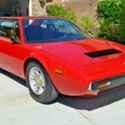 Ferrari Dino 308 GT4
Ferrari Dino 308 GT4
Mileage: 51900
 Ferrari Dino 206 GT
Ferrari Dino 206 GT
Mileage: 22,370
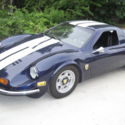 1975 FERRARI DINO 246
1975 FERRARI DINO 246
Mileage: 11,956
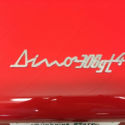 1975 Ferrari Dino 308 GT4
1975 Ferrari Dino 308 GT4
Mileage: 999,999
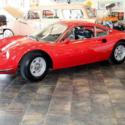 1969 Ferrari Dino
1969 Ferrari Dino
Mileage: 16,770
 246 Ferrari Dino GT 1972
246 Ferrari Dino GT 1972
Mileage: 84,424
 1973 Ferrari Dino
1973 Ferrari Dino
Mileage: 16,365
 1973 Ferrari Dino 246 GTS
1973 Ferrari Dino 246 GTS
Mileage: 43,743
 1974 Ferrari Dino
1974 Ferrari Dino
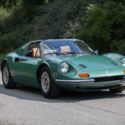 1972 Ferrari Dino
1972 Ferrari Dino
Mileage: 43,000












